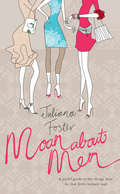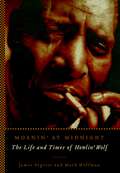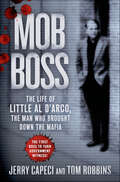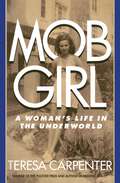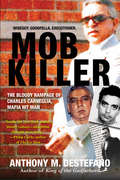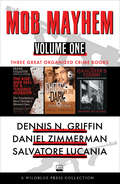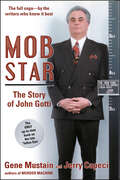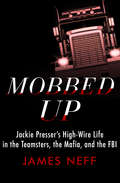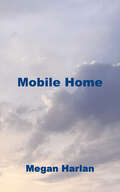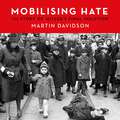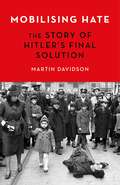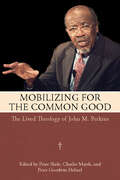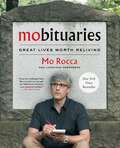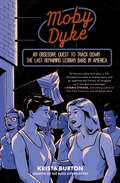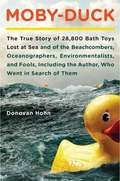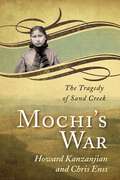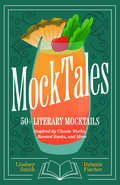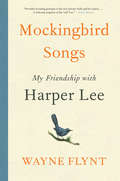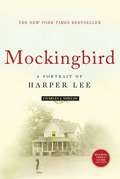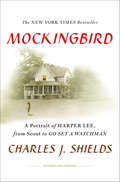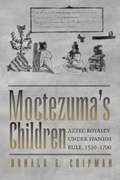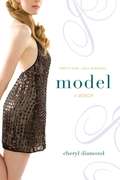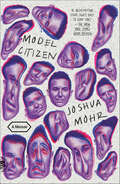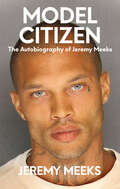- Table View
- List View
Moan About Men: A Joyful Guide to the Things Men Do That Drive Women Mad
by Juliana FosterWhat is it about men that drives women to distraction? Could it be the way they flick to the footie results while you're trying to watch your favourite television programme? Is it their dogged inability to admit that they might - just might - be wrong? Or is it the infuriating way that they can meticulously order and maintain comprehensive record collections but can't quite find the time to rinse the sink after shaving? From unsightly splayed legs and headache-inducing snoring to the bathroom blight of poorly positioned pee and the horrors of man-flu, MOAN ABOUT MEN is a brilliantly funny take on all the things men do that make women weep with frustration - and also with mirth. In an amusing and all-encompassing rant, this is a chance to get it off your chest and dare to share in a life-affirming moan about men.
Moanin' at Midnight: The Life and Times of Howlin' Wolf
by James Segrest Mark Hoffman<P>Howlin' Wolf was a musical giant in every way. <P>He stood six foot three, weighed almost three hundred pounds, wore size sixteen shoes, and poured out his darkest sorrows onstage in a voice like a raging chainsaw. Half a century after his first hits, his sound still terrifies and inspires. <P>Born Chester Burnett in 1910, the Wolf survived a grim childhood and hardscrabble youth as a sharecropper in Mississippi. <P>He began his career playing and singing with the first Delta blues stars for two decades in perilous juke joints. <P>He was present at the birth of rock 'n' roll in Memphis, where Sam Phillips-who also discovered Elvis Presley, Johnny Cash, and Jerry Lee Lewis-called Wolf his "greatest discovery." <P>He helped develop the sound of electric blues and vied with rival Muddy Waters for the title of king of Chicago blues. He ended his career performing and recording with the world's most famous rock stars. <P>His passion for music kept him performing-despite devastating physical problems-right up to his death in 1976. <P>There's never been a comprehensive biography of the Wolf until now. Moanin' at Midnight is full of startling information about his mysterious early years, surprising and entertaining stories about his decades at the top, and never-before-seen photographs. It strips away all the myths to reveal-at long last-the real-life triumphs and tragedies of this blues titan.
Mob Boss: The Life of Little Al D'Arco, the Man Who Brought Down the Mafia
by Tom Robbins Jerry Capeci“[A] fascinating new book about mafia boss Alfonso D’Arco, who became the federal government’s most successful cooperator.” —The Village VoiceAlfonso “Little Al” D’Arco, the former acting boss of the Luchese organized crime family, was the highest-ranking mobster to ever turn government witness when he flipped in 1991. His decision to flip prompted many others to make the same choice, including John Gotti’s top aide, Salvatore “Sammy the Bull” Gravano, and his testimony sent more than fifty mobsters to prison.In Mob Boss, award-winning news reporters Jerry Capeci and Tom Robbins team up for this unparalleled account of D’Arco’s life and the New York mob scene that he embraced for four decades.Until the day he switched sides, D’Arco lived and breathed the old-school gangster lessons he learned growing up in Brooklyn and fine-tuned on the mean streets of Little Italy. But when he learned he was marked to be whacked, D’Arco quit the mob. His defection decimated his crime family and opened a window on mob secrets going back a hundred years.After speaking with D’Arco, the authors reveal unprecedented insights, exposing shocking secrets and troublesome truths about a city where a famous pizza parlor doubled as a Mafia center for multi-million-dollar heroin deals, where hit men carried out murders dressed as women, and where kidnapping a celebrity newsman’s son was deemed appropriate revenge for the father’s satirical novel.Capeci and Robbins spent hundreds of hours in conversation with D’Arco, and exhausted many hours more fleshing out his stories in this riveting narrative that takes readers behind the famous witness testimony for a comprehensive look at the Mafia in New York City.
Mob Girl: A Woman's Life In the Underworld
by Teresa CarpenterA Simon & Schuster eBook. Simon & Schuster has a great book for every reader.
Mob Killer: The Bloody Rampage of Charles Carneglia, Mafia Hit Man
by Anthony M. DeStefanoA Crazed KillerHe dissolved the bodies of some of his victims in acid and poured them down the sewer. He hung grisly souvenirs on nails in his junkyard. La Costra NostraCharles Carneglia was a stone-cold killer who fell in with the bloodthirsty John Gotti crew. As the infamous crime family rose to power with their murderous trail of sex, jealousy, greed, and revenge, Carneglia rose with them. Mafia, Madness And MurderThis is the horrifying story of a misfit who fit perfectly into the New York mafia. In a harrowing journey inside a ruthless criminal underworld, Pulitzer Prize-winning reporter Anthony M. DeStefano chronicles one man's life in a world of depraved acts of violence and the horrors that went with being a member of the Gambino family. "Thrilling American crime writing." -Jimmy Breslin on King of the GodfathersIncludes 16 Pages of Shocking Photos
Mob Mayhem Volume One: The Rise and Fall of a 'Casino' Mobster, Shots in the Dark, The Gangster's Cousin (Mob Mayhem #1)
by Dennis N. Griffin Daniel Zimmerman Salvatore "Sal" LucaniaIf you liked The Godfather and Goodfellas, you&’ll love these three up-close-and-personal true accounts of gangsters and organized crime.THE RISE AND FALL OF A &“CASINO&” MOBSTER: The Tony Spilotro Story Through a Hitman&’s Eyes by Frank Cullota and Dennis Griffin Bestselling &“mob expert&” Dennis Griffin and former mob enforcer and Spilotro confidant, Frank Cullota, tell the story of the Las Vegas gangster whose quest for power and lack of self-control with women cost the Mob its control of Vegas—and lost Tony his life. &“Sets the record straight about Tony the man and Tony the mobster. It&’s an eye-opener.&”—Frank Calabrese, Junior, author of Operation Family Secrets SHOTS IN THE DARK: The Saga of Rocco Balliro by Daniel Zimmerman In 1963, Rocco Balliro and a pair of associates stormed an apartment in Boston and were immediately caught in a shootout with Boston police officers, waiting in ambush for him. It was a rescue mission that went downhill in a hurry, leaving his beloved girlfriend and her toddler son dead. &“Fascinating . . . a real page-turner for Mob enthusiasts and organized crime history buffs.&”—Dennis N. Griffin, bestselling author of The Rise and Fall Of A &“Casino&” Mobster THE GANGSTER&’S COUSIN: Growing up in the Luciano Family by Salvatore Lucania Young Sal navigates the streets of Harlem, experiencing the inherent corruption of the US justice system and discovering the truth about the secret world of outlaw figures—like his cousin and namesake, Charles &“Lucky&” Luciano. &“A wonderfully different take on the usual Mafia story . . . a sometimes exciting, sometimes poignant, and often humorous adventure.&”—Thrive Global
Mob Star: The Story of John Gotti
by Gene Mustain Jerry CapeciHe was a little-known wiseguy out of Howard Beach, Queens, who blasted his way into the public eye with the assassination of Gambino Family boss Paul Castellano in December 1985, a rubout that&’s the stuff of Mafia legend. Ruthless, cunning, and tougher than the streets that produced him, John Gotti seized control of the nation&’s most powerful crime family, beat the law on rap after rap, and became an American legend. First published in 1988 and fully revised and updated for this edition, Mob Star traced John Gotti&’s spectacular rise and eventual downfall after the betrayal of his closest ally, Salvatore &“Sammy Bull&” Gravano. At his death, ten years after he was jailed for life and four years after he began battling cancer, John Gotti was still the biggest name in today&’s Mafia.
Mobbed Up: Jackie Presser's High-Wire Life in the Teamsters, the Mafia, and the FBI
by James NeffThe spellbinding saga of Teamster boss Jackie Presser's rise and fall In his rise from car thief to president of America's largest labor union, Jackie Presser used every ounce of his street smarts and rough-edged charisma to get ahead. He also had a lot of help along the way--not just from his father, Bill Presser, a Teamster power broker and thrice-convicted labor racketeer, but also from the Mob and the FBI. At the same time that he was taking orders from the Cleveland Mafia and New York crime boss Fat Tony Salerno, Presser was serving as the FBI's top informant on organized crime. Meticulously researched and dramatically told, Mobbed Up is the story of Presser's precarious balancing act with the Teamsters, the Mafia, and the Justice Department. Drawing on thousands of pages of classified files, James Neff follows the trail of greed, corruption, and hubris all the way to the Nixon and Reagan White Houses, where Bill and Jackie Presser were treated as valued friends. Winner of an Investigative Reporters & Editors Award for best reporting on organized crime, it is a tale too astonishing to be made up--and too troubling to be ignored.
Mobile Home: A Memoir in Essays (Association of Writers and Writing Programs Award For Creative Nonfiction Ser.)
by Megan HarlanUprooting ourselves and putting down roots elsewhere has become second nature. Americans are among the most mobile people on the planet, moving house an average of nine times in adulthood. This book explores one family's extreme and often international version of this common experience. Inspired by the author's globe-wandering childhood-during which she lived in seventeen homes across four continents, ranging in location from the Alaskan tundra to a Colombian jungle, a posh flat in London to a doublewide trailer near the Arabian Gulf-the book maps the emotional structures and metaphysical geographies of home. In ten interconnected essays, the author examines cultural histories that include Bedouin nomadic traditions and modern life in wheeled mobile homes, the psychology of motels and suburban tract housing, and the lived meanings within the built landscapes of Manhattan, Stonehenge, and the Winchester Mystery House. More personally, she traces the family histories that drove her parents to seek so many new horizons-and how those places shaped her upbringing. Her mother viewed houses as a kind of large-scale plastic art ever in need of renovating, while her father was a natural adventurer and loved nothing more than to travel, choosing a life of flight that also helped to mask his addiction to alcohol. These familial experiences color the author's current journey as a mother attempting to shape a flourishing, rooted world for her son. Her memoir in essays skillfully explores the flexible, continually inventive natures of place, family, and home.
Mobilising Hate: The Story of Hitler's Final Solution
by Martin Davidson'Finally, eight decades on, there comes a convincing reason as to how an entire nation was able to swallow and then endorse the warped ideology of Hitler and the Nazis. Not only a brilliantly argued book, Mobilising Hate is also a grimly compelling and utterly absorbing examination of one of the most terrible events in world history. Martin Davidson's meticulous and scholarly research and exquisite writing has provided us with one of the most important books ever written on the subject.' JAMES HOLLAND'A highly readable thesis of how ordinary people were turned into monsters by the malevolent propaganda of Hitler and his henchmen ... A very good book.' SAUL DAVID, TelegraphBy 1942, it was an article of faith that what the Nazis called 'The Jewish Question' had only one answer: the mass extermination of an entire people. Six million European Jews were savagely murdered as a result of this perverted but profoundly held conviction. In this radical new perspective on Hitler's so-called 'Final Solution', Martin Davidson shows that the terrible fate of Europe's Jews was not one Nazi policy amongst many, but the central preoccupation of the regime, one which they were determined to achieve and of which they were most chillingly proud. How were so many people convinced that the Jews deserved such treatment - or were at least persuaded to shrug their shoulders and turn a blind eye? Why did they think Germany could only be reborn with their eradication? That Jewish suffering was not only necessary, but deserved? How were the moral standards of an entire nation so warped and perverted, that the Final Solution came to be regarded as a rational, thrilling, even sacred, element of Nazi state policy? Mobilising Hate examines in detail how Nazi ideologues worked to frame and amplify anti-Jewish feeling in Germany. Davidson explores the origins of radical anti-Jewish polemic in the volcanic upheavals that swept over Germany in the months after the First World War. How it seeded a theory that claimed to explain the truth of the entirety of human history. How that theory would go on to pervert science; corrupt the law; rewrite history; taint art, music and literature; and turn the media into the servant of a brutal and pitiless regime with a single message to communicate: destroying Jews lives was the indispensable first step to making Germany - and indeed, Europe - great again. Davidson goes on to track the way in which Nazi leaders moved from theory to practice, by accident and by design, skilfully dramatising the many twists and turns that would lead to Auschwitz and beyond, many of which are not generally included in conventional accounts. Mobilising Hate is driven by the first-hand accounts of many of those defined by the Nazi genocide; both its architects and perpetrators, as well as its targeted victims. Poignantly too, the book turns the spotlight on the whistle-blowers who saw, recorded and shared accounts of the horrors unfolding across the continent - only to be greeted time and time again, with guarded and non-committal hedging from Allied governments. Many people inside Germany, and across the world, knew, but, it seemed, very few felt they needed to care. As our world once again grapples with the challenges of global mass resentment, economic insecurity and the growing desire to find people - entire populations - at whom to point the finger of blame, the issue of Hitler's Final Solution and the thinking that gave birth to it have worrying new resonance. Rarely has the 'warning from history' been so acute, nor the refrain 'never again', been so heartfelt. Above all, Mobilising Hate is the story of how the Nazis spawned a vision of 'us' and 'them', that taken to its logical conclusion, spelled a death sentence for millions. Hitler may have lacked an early masterplan for the mass extermination of Europe's Jews, but it would be his zealously constructed policies and unflinching determination to see them
Mobilising Hate: The Story of Hitler's Final Solution
by Martin DavidsonPraise for The Perfect Nazi:'Absorbing, highly readable and painstakingly researched' NIALL FERGUSON 'Unforgettable, haunting reading' SIMON SCHAMA'A fascinating and extraordinary journey into the banality of evil at the heart of Nazism' BEN MACINTYREBy 1942, it was an article of faith that what the Nazis called 'The Jewish Question' had only one answer: the mass extermination of an entire people. Six million European Jews were savagely murdered as a result of this perverted but profoundly held conviction. In this radical new perspective on Hitler's so-called 'Final Solution', Martin Davidson shows that the terrible fate of Europe's Jews was not one Nazi policy amongst many, but the central preoccupation of the regime, one which they were determined to achieve and of which they were most chillingly proud. How were so many people convinced that the Jews deserved such treatment - or were at least persuaded to shrug their shoulders and turn a blind eye? Why did they think Germany could only be reborn with their eradication? That Jewish suffering was not only necessary, but deserved? How were the moral standards of an entire nation so warped and perverted, that the Final Solution came to be regarded as a rational, thrilling, even sacred, element of Nazi state policy? Mobilising Hate examines in detail how Nazi ideologues worked to frame and amplify anti-Jewish feeling in Germany. Davidson explores the origins of radical anti-Jewish polemic in the volcanic upheavals that swept over Germany in the months after the First World War. How it seeded a theory that claimed to explain the truth of the entirety of human history. How that theory would go on to pervert science; corrupt the law; rewrite history; taint art, music and literature; and turn the media into the servant of a brutal and pitiless regime with a single message to communicate: destroying Jews lives was the indispensable first step to making Germany - and indeed, Europe - great again. Davidson goes on to track the way in which Nazi leaders moved from theory to practice, by accident and by design, skilfully dramatising the many twists and turns that would lead to Auschwitz and beyond, many of which are not generally included in conventional accounts. Mobilising Hate is driven by the first-hand accounts of many of those defined by the Nazi genocide; both its architects and perpetrators, as well as its targeted victims. Poignantly too, the book turns the spotlight on the whistle-blowers who saw, recorded and shared accounts of the horrors unfolding across the continent - only to be greeted time and time again, with guarded and non-committal hedging from Allied governments. Many people inside Germany, and across the world, knew, but, it seemed, very few felt they needed to care. As our world once again grapples with the challenges of global mass resentment, economic insecurity and the growing desire to find people - entire populations - at whom to point the finger of blame, the issue of Hitler's Final Solution and the thinking that gave birth to it have worrying new resonance. Rarely has the 'warning from history' been so acute, nor the refrain 'never again', been so heartfelt. Above all, Mobilising Hate is the story of how the Nazis spawned a vision of 'us' and 'them', that taken to its logical conclusion, spelled a death sentence for millions. Hitler may have lacked an early masterplan for the mass extermination of Europe's Jews, but it would be his zealously constructed policies and unflinching determination to see them through to the bitter end that would make it impossible for his Nazi Holocaust not to happen. That the Jews should face total extermination was Hitler's biggest, proudest prophecy, and the one he moved mountains to make come true, no matter the cost.
Mobilizing for the Common Good: The Lived Theology of John M. Perkins
by John M. PerkinsBorn into a sharecropping family in New Hebron, Mississippi, in 1930, and only receiving a third-grade education, John M. Perkins has been a pioneering prophetic African American voice for reconciliation and social justice to America's white evangelical churches. Often an unwelcome voice and always a passionate, provocative clarion, Perkins persisted for forty years in bringing about the formation of the Christian Community Development Association—a large network of evangelical churches and community organizations working in America's poorest communities—and inspired the emerging generation of young evangelicals concerned with releasing the Church from its cultural captivity and oppressive materialism. John M. Perkins has received surprisingly little attention from historians of modern American religious history and theologians. Mobilizing for the Common Good is an exploration of his theological significance. With contributions from theologians, historians, and activists, this book contends that Perkins ushered in a paradigm shift in twentieth-century evangelical theology that continues to influence Christian community development projects and social justice activists today.
Mobituaries: Great Lives Worth Reliving
by Mo RoccaFrom beloved CBS Sunday Morning correspondent and humorist Mo Rocca, an entertaining and rigorously researched book that celebrates the dead people who have long fascinated him. <P><P>Mo Rocca has always loved obituaries—reading about the remarkable lives of global leaders, Hollywood heavyweights, and innovators who changed the world. But not every notable life has gotten the send-off it deserves. His quest to right that wrong inspired Mobituaries, his #1 hit podcast. <P><P>Now with Mobituaries, the book, he has gone much further, with all new essays on artists, entertainers, sports stars, political pioneers, founding fathers, and more. Even if you know the names, you’ve never understood why they matter...until now. Take Herbert Hoover: before he was president, he was the “Great Humanitarian,” the man who saved tens of millions from starvation. But after less than a year in the White House, the stock market crashed, and all the good he had done seemed to be forgotten. <P><P>Then there’s Marlene Dietrich, well remembered as a screen goddess, less remembered as a great patriot. Alongside American servicemen on the front lines during World War II, she risked her life to help defeat the Nazis of her native Germany. And what about Billy Carter and history’s unruly presidential brothers? Were they ne’er-do-well liabilities…or secret weapons? <P><P>Plus, Mobits for dead sports teams, dead countries, the dearly departed station wagon, and dragons. Yes, dragons. Rocca is an expert researcher and storyteller. He draws on these skills here. With his dogged reporting and trademark wit, Rocca brings these men and women back to life like no one else can. Mobituaries is an insightful and unconventional account of the people who made life worth living for the rest of us, one that asks us to think about who gets remembered, and why. <P><P><b>A New York Times Bestseller</b>
Moby Dyke: An Obsessive Quest To Track Down The Last Remaining Lesbian Bars In America
by Krista BurtonA former Rookie contributor and creator of the popular blog Effing Dykes investigates the disappearance of America&’s lesbian bars by visiting the last few in existence.Lesbian bars have always been treasured safe spaces for their customers, providing not only a good time but a shelter from societal alienation and outright persecution. In 1987, there were 206 of them in America. Today, only a couple dozen remain. How and why did this happen? What has been lost—or possibly gained—by such a decline? What transpires when marginalized communities become more accepted and mainstream? In Moby Dyke, Krista Burton attempts to answer these questions firsthand, venturing on an epic cross-country pilgrimage to the last few remaining dyke bars. Her pilgrimage includes taking in her first drag show since the onset of the pandemic at The Back Door in Bloomington, Indiana; competing in dildo races at Houston&’s Pearl Bar; and, despite her deep-seated hatred of karaoke, joining a group serenade at Nashville&’s Lipstick Lounge and enjoying the dreaded pastime for the first time in her life. While Burton sets out on the excursion to assess the current state of lesbian bars, she also winds up examining her own personal journey, from coming out to her Mormon parents to recently marrying her husband, a trans man whose presence on the trip underscores the important conversation about who precisely is welcome in certain queer spaces—and how they and their occupants continue to evolve. Moby Dyke is an insightful and hilarious travelogue that celebrates the kind of community that can only be found in windowless rooms soundtracked by Britney Spears-heavy playlists and illuminated by overhead holiday lights no matter the time of year.
Moby-Duck: The True Story of 28,800 Bath Toys Lost at Sea and of the Beachcombers, Oceanographers, Environmentalists, and Fools, Including the Author, Who Went in Search of Them
by Donovan HohnA revelatory tale of science, adventure, and modern myth, "Moby-Duck" is the true story of 28,800 bath toys lost at sea, and of the people who went after them.
Mochi's War: The Tragedy of Sand Creek
by Chris Enss Howard KazanjianColorado Territory in 1864 wasn't merely the wild west, it was a land in limbo while the Civil War raged in the east and politics swirled around its potential admission to the union. The territorial governor, John Evans, had ambitions on the national stage should statehood occur--and he was joined in those ambitions by a local pastor and erstwhile Colonel in the Colorado militia, John Chivington. The decision was made to take a hard line stance against any Native Americans who refused to settle on reservations--and in the fall of 1864, Chivington set his sights on a small band of Cheyenne under the chief Black Eagle, camped and preparing for the winter at Sand Creek.When the order to fire on the camp came on November 28, one officer refused, other soldiers in Chivington's force, however, immediately attacked the village, disregarding the American flag, and a white flag of surrender that was run up shortly after the soldiers commenced firing. In the ensuing "battle" fifteen members of the assembled militias were killed and more than 50 wounded Between 150 and 200 of Black Kettle&’s Cheyenne were estimated killed, nearly all elderly men, women and children. As with many incidents in American history, the victors wrote the first version of history--turning the massacre into a heroic feat by the troops. Soon thereafter, however, Congress began an investigation into Chivington's actions and he was roundly condemned. His name still rings with infamy in Colorado and American history. Mochi&’s War explores this story and its repercussions into the last part of the nineteenth Century from the perspective of a Cheyenne woman whose determination swept her into some of the most dramatic and heartbreaking moments in the conflicts that grew through the West in the aftermath of Sand Creek.
MockTales: 50+ Literary Mocktails Inspired by Classic Works, Banned Books, and More
by Lindsey Smith Delanie FischerEnjoy co-authors Delanie Fischer and Lindsey Smith&’s delicious mocktail adaptations of your favorite books and authors. Beloved stories with a sober twist. Have you ever wondered what the ladies from your favorite Jane Austen books would drink at a ball? What Jay Gatsby would be serving at his crazy parties? Experience these answers for yourself with Lindsey Smith and Delanie Fischer&’s all-new zero-proof drink cookbook. MockTales captures the intoxicating atmosphere of the bestsellers that we know and love. Featuring over fifty plant-based recipes that are easy to make and full of nutritious flavors, you&’ll enjoy your next reread like never before with these delicious mocktails. A toast to the authors who made history. Each recipe inside MockTales is inspired by the literary characters and settings, but also the minds behind these incredible stories. Explore alcohol-free concoctions based on famous authors such as Alice Walker, Ernest Hemingway, Margaret Atwood, and more. Using ingredients that pay homage to their biographies, writing styles, and famous quotes, each sip will have you and fellow book lovers falling in love with these incredible writers all over again. Enjoy over 50 recipes inspired by banned books and literary classics from all genres, such as: Historical fiction novels like Les Miserables, Little Women, and Huckleberry Finn Romance books such as Jane Eyre and Wuthering Heights Fantasy adventures including The Odyssey, Alice in Wonderland, and The Chronicles of Narnia Science fiction and horror tales such as Frankenstein and The Handmaid&’s Tale So if you liked fun mocktail and cocktail books such as Tequila Mockingbird, The Art of Mixology Mocktails, or Flavor Lab Creations, then we recommend MockTales for you.
Mockingbird Songs: My Friendship with Harper Lee
by Wayne Flynt“Provides revealing portraits of the very private Nelle and her sisters . . . A welcome snapshot of the ‘real’ Lee.” —Kirkus ReviewsAn indelible portrayal of one of American literature’s most beloved authors—a collection of letters between Harper Lee and one of her closest friends that reveals the famously private writer as never before.The violent racism of the American South drove Wayne Flynt away from his home state of Alabama, but the publication of To Kill a Mockingbird, Harper Lee’s classic novel about courage, community, and equality, inspired him to return in the early 1960s and craft a career documenting and teaching Alabama history. His writing resonated with many Alabamians, in particular three sisters: Louise, Alice, and Nelle Harper Lee. Beginning with their first meeting in 1983, a mutual respect and affection for the state’s history and literature matured into a deep friendship between two families.Flynt and Nelle Harper Lee began writing to one other while she was living in New York—heartfelt, insightful, and humorous letters in which they swapped stories, information, and opinions on their families, books, Alabama history and social values, health concerns, even their fears and accomplishments. Though their earliest missives began formally, their mutual admiration grew, their exchanges became more intimate. Beautifully written, this remarkable compendium of their letters—a correspondence that lasted for a quarter century—offers a compelling look into the mind, heart, and work of one of the most beloved authors in modern literary history.“A satisfying glimpse of a famously reserved literary great.” —Publishers Weekly“Flynt offers an overview of Lee’s life with admiration, humor, and palpable love.” —Library Journal
Mockingbird: A Portrait of Harper Lee
by Charles J. ShieldsTo Kill a Mockingbird--the twentieth century's most widely read American novel--has sold thirty million copies and still sells a million yearly. Yet despite her book's perennial popularity, its creator, Harper Lee, has become a somewhat mysterious figure. Now, after years of research, Charles J. Shields brings to life the warmhearted, high-spirited, and occasionally hardheaded woman who gave us two of American literature's most unforgettable characters--Atticus Finch and his daughter, Scout. At the center of Shields's evocative, lively book is the story of Lee's struggle to create her famous novel, but her colorful life contains many highlights--her girlhood as a tomboy in overalls in tiny Monroeville, Alabama; the murder trial that made her beloved father's reputation and inspired her great work; her journey to Kansas as Truman Capote's ally and research assistant to help report the story ofIn Cold Blood. Mockingbird--unique, highly entertaining, filled with humor and heart--is a wide-ranging, idiosyncratic portrait of a writer, her dream, and the place and people whom she made immortal.
Mockingbird: A Portrait of Harper Lee, from Scout to Go Set a Watchman
by Charles J. ShieldsAn extensively revised and updated edition of the bestselling biography of Harper Lee, reframed from the perspective of the recent publication of Lee's Go Set a WatchmanTo Kill a Mockingbird—the twentieth century's most widely read American novel—has sold thirty million copies and still sells a million yearly. In this in-depth biography, first published in 2006, Charles J. Shields brings to life the woman who gave us two of American literature's most unforgettable characters, Atticus Finch and his daughter, Scout.Years after its initial publication—with revisions throughout the book and a new epilogue—Shields finishes the story of Harper Lee's life, up to its end. There's her former agent getting her to transfer the copyright for To Kill a Mockingbird to him, the death of Lee's dear sister Alice, a fuller portrait of Lee’s editor, Tay Hohoff, and—most vitally—the release of Lee's long-buried first novel and the ensuing public devouring of what has truly become the book of the year, if not the decade: Lee's Go Set a Watchman.
Moctezuma's Children: Aztec Royalty under Spanish Rule, 1520-1700
by Donald E. ChipmanThough the Aztec Empire fell to Spain in 1521, three principal heirs of the last emperor, Moctezuma II, survived the conquest and were later acknowledged by the Spanish victors as reyes naturales (natural kings or monarchs) who possessed certain inalienable rights as Indian royalty. For their part, the descendants of Moctezuma II used Spanish law and customs to maintain and enhance their status throughout the colonial period, achieving titles of knighthood and nobility in Mexico and Spain. So respected were they that a Moctezuma descendant by marriage became Viceroy of New Spain (colonial Mexico's highest governmental office) in 1696.
Model
by Cheryl DiamondEvery year, hundreds of the most beautiful people in the world come to New York to become models. At age fourteen, Cheryl Diamond was one of them. Living on her own in a run-down apartment, Cheryl spent her days on go-sees, runways, and shoots, surviving hand-to-mouth, while taking in everything she could about the tough and sleazy modeling industry. She watched other girls make mistakes, and swore she wouldn't be a victim. . . until a career-altering event changed her life and nearly ruined her shot at her dream. This is the riveting, true account of Cheryl's triumphant rise, disastrous fall, and phoenix-like comeback in one of the hottest and most demanding industries in the world.
Model Citizen: A Memoir
by Joshua MohrThe intimate, gorgeous, garish confessions of Joshua Mohr—writer, father, alcoholic, addictHer teeth marks in the wood are some of my favorite things. Every now and again she rips the pick out of my hand and tosses it inside the guitar . . . I hold it over my head, hole down, shaking it back and forth, the pick rattling around in there. And as it ricochets from side to side, I always think about pills. Maybe the pick has turned into oxy. Or Norco, codeine, Demerol. Maybe it’s a pill and when it falls out I can gobble it up.After years of hard-won sobriety, while rebuilding a life with his wife and young daughter, thirty-five-year-old Joshua Mohr suffers a stroke—his third, it turns out— which uncovers a heart condition requiring surgery. Which requires fentanyl, one of his myriad drugs of choice. This forced “freelapse” should fix his heart, but what will it do to his sobriety? And what if it doesn’t work?Told in stunning, surreal, time-hopping vignettes, Model Citizen is a raw, revealing portrait of an addict. Mohr shines a harsh spotlight into all corners of his life, throwing the wild joys, tragedies, embarrassments, and adventures of his past into bold relief.Pulsing with humanity and humor, revealing the immediacy of an addict climbing out of the murky pit of his past, Model Citizen is a darkly beautiful, incisive confession.
Model Citizen: The Autobiography of Jeremy Meeks
by Jeremy MeeksJeremy Meeks first catapulted to fame when his mugshot went viral, earning him the nickname &“Prison Bae.&” But beyond the headlines and the high fashion, Model Citizen reveals a complex journey from hardship to reinvention.This memoir traces Meeks&’s early life of adversity—from an unsettled childhood to the struggles that led to prison and, eventually, to an unexpected turn on the runway. With grit and a drive to rebuild, Meeks transitioned from gang-tied adolescence to modeling and Hollywood. But his story isn&’t about a perfect transformation; rather, it&’s a real and ongoing journey, shaped by resilience and an ever-evolving pursuit of something more.Model Citizen explores the man behind the viral photo, sharing both his triumphs and challenges as he navigates a path from poverty to the glamour of high fashion, in a modern take on the American Dream.Includes 46 photos, featuring 24 full-page color modeling photos by celebrity photographer Jim Jordan.
